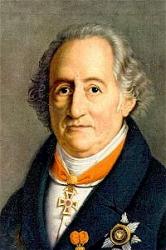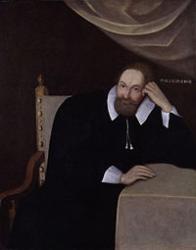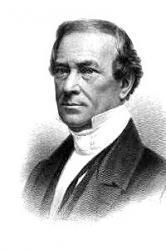Planning worship?
Check out our sister site, ZeteoSearch.org,
for 20+ additional resources related to your search.
- |
User Links
Person Results
J. W. von Goethe

1749 - 1832 Person Name: Goethe Author of "O'er silent field and lonely lawn" in Isles of Shoals Hymn Book and Candle Light Service Goethe, Johann Wolfgang von, son of Johann Caspar Goethe, a lawyer at Frankfurt-am-Main; was born at Frankfurt Aug. 28,1749, and died at Weimar, March 22, 1832. The greatest German poet of his day, and one of the most famous literary men of his own or any age, his sympathies were Classical rather than distinctively Christian; and as he himself said (Conversations with Eckerman, January 4, 1827), he wrote no poems suited for use in public worship.
A few pieces, principally from his well-known dramatic poem of Faust (pt. i. 1808; pt. ii. pub. posthumously, 1832), are found under his name in one or two Unitarian hymn-books. Good translations of both parts of Faust have been published by Dr. John Anster, Bayard Taylor, Sir Theodore Martin, and others; while a very large number of other persons have published translations of the first part. No attempt has accordingly been made to notice any translations except those in the hymn-books.
i. From Faust, pt. i., 1808.
i. Christ ist erttanden! Freude dem Sterbliche. Easter. The chorus of angels on Easter Day. Translated as “Christ has arisen! Joy to our buried Head," by Dr. F. H. Hedge, in his Supplement to Hymns for the Church of Christ, Boston, U.S., 1853, No. 836. A free version is also noted under A. C. Cox, No. 4.
ii. Die Sonne tönt nach alter Weise. Praise. The Song of the three Archangels in the Prologue in Heaven. Translated as "The sun is still for ever sounding," by Dr. F. H. Hedge, as above, 1853, No. 190.
iii. Verlassen nab ich Feld und Auen. [Evening]. Faust's Soliloquy on entering his study with the dog, Translated as "O'er silent field and lonely lawn," as No. 21 in W. J. Fox's Hymns & Anthems, 1841, repeated in English and American Unitarian collections.
ii. Miscellaneous.
iv. Des Maurers Wandeln. Written for the Freemasons' Lodge at Weimar, of which he became a member in 1780, and included in his Werke, 1828, vol. iii. p. 61, entitled "Symbolum." Translated as "The Mason’s ways are A type of Existence," by T. Carlyle, in his Past and Present, 1843, p. 318. Included,beginning "The future hides in it" (st. ii.), as No. 854 in Dr. Hedge's Collection, 1853, as above.
Two pieces are also found in collections under his name, viz.:—
1. Without haste! without rest, in Hymns of the Ages, Boston, U.S., 3rd Ser., 1865, p. 76, and repeated as "Without haste and without rest," in Stopford Brooke's Christian Hymns, 1881, &c. It is suggested by " Wie das Gestern Ohne Hast, Aber Ohne Hast, Drehe sich jeder, Urn die eigne Last," in Goethe's Zahme Xenien, 2nd Ser., 1823 (Werke, 1828, iii. p. 245).
2. Rest is not quitting The busy career. [Rest]| This is part of a piece beginning "Sweet is the pleasure Itself cannot spoil." No. 853 in Dr. Hedge's Collection, 1853, as above, marked as by " J. S. Dwight." There does not appear to be any equivalent poem in Goethe's Werke. [Rev. James Mearns, M.A.]
--John Julian, Dictionary of Hymnology, (1907)
===========================
Goethe, J. W. von, p. 441, i. The Exeter Unitarian Hymns, Psalms and Anthems, of 1863 and 1884, contains the several additional hymns from Goethe, the translations in each case being by the Rev. T. W. Chignell. Some of the versions are very free, and the distinctively Christian character of the translations is only very faintly present in the originals. [Rev. James Mearns, M.A.]
--John Julian, Dictionary of Hymnology, Appendix, Part II (1907)
J. W. von Goethe
Matthias Loy

1828 - 1915 Person Name: Rev. Matthias Loy, D. D. Author of "How matchless is our Savior's grace" in Evangelical Lutheran hymnal Loy, M., President of the Capital University, Columbus, Ohio, contributed several original hymns, and translations from the German, to the Evangelical Lutheran Hymnal. Published by Order of the Evangelical Lutheran Joint Synod of Ohio and Other States. Columbus, Ohio, 1880.
The translations may be found through the Index of Authors, &c.; the original hymns are the following:—
1. An awful mystery is here. Holy Communion.
2. At Jesus' feet our infant sweet. Holy Baptism.
3. Come, humble soul, receive the food. Holy Communion.
4. Give me, 0 Lord, a spirit lowly. Humility desired.
5. God gave His word to holy men. Inspiration of Holy Scripture.
6. God of grace, Whose word is sure. Faithfulness.
7. How matchless is our Saviour's grace. Holy Baptism.
8. I thank Thee, Saviour, for the grief. Lent.
9. Jesus took the lambs and blest them. Holy Baptism.
10. Jesus, Thou art mine for ever. Jesus, All and in All.
11. Launch out into the deep. Call to Duty.
12. Listen to those happy voices. Christmas.
13. O Great High Priest, forget not me. Confirmation.
14. O Lord, Who hast my place assigned. Daily Duties.
15. Our Shepherd of His ransomed flock. Holy Communion.
16. The gospel shows the Father's grace. Holy Scripture.
17. The law of God is good and wise. Holy Scripture.
18. Though angels bright escape our eight. St. Michael and All Angels.
19. When Rome had shrouded earth in night. The Reformation.
20. When souls draw near the holy wave. Confirmation.
Several of these hymns, together with some of his translations, previously appeared in the Ohio Synod's preceding Collection of Hymns (3rd ed., 1858; 4th, 1863).
--John Julian, Dictionary of Hymnology (1907)
====================
Loy, Matthias, D.D., p. 700, i. Dr. Loy was born in Cumberland County, Pennsylvania, March 17, 1828. He studied at the Evangelical Lutheran Theological Seminary at Columbus, Ohio, of which he became Professor of Theology in 1365. He was appointed President of the Capital University in 1880.
--John Julian, Dictionary of Hymnology, Appendix, Part II (1907)
==================
See also in:
Wikipedia
Matthias Loy
William Henry Gardner
Person Name: William Gardiner Composer of "GERMANY" in The Cyber Hymnal Late 19th Century
William Henry Gardner
Samuel Ecking
1757 - 1785 Author of "Peace, troubled soul, thou need'st not fear" in The Evangelical Hymnal Ecking, Samuel, a Baptist, born at Shrewsbury, Dec. 5, 1757, died Jan. 16, 1785, contributed hymns to the Gospel Magazine, in 1778 and 1779, under the signature of "S. E—k—-g." Of these the hymn, "Peace, peace, my soul," is in common use. This hymn is also found in his Essays on Grace, Faith, and Experience.
[William T. Brooke]
-- John Julian, Dictionary of Hymnology (1907)
Samuel Ecking
Sir Henry Wotton

1568 - 1639 Person Name: Wenton Author of "How happy is he, born and taught" in Song-Hymnal of Praise and Joy Wotton, Sir Henry, M.A., born in Kent in 1568, and educated at New and at Queen's Colleges, Oxford. After spending nine years on the Continent, on his return he became secretary to Robert, Earl of Essex, with whom he continued until Essex was committed for high treason, when he retired to Florence. There he became known to the Grand Duke of Tuscany, and was sent by him, in the name of "Octavio Baldi," with letters to James VI., King of Scotland, in which the king was informed of a design against his life. On succeeding to the English throne James knighted Wotton and sent him as ambassador to the Republic of Venice. In 1623 he was made Provost of Eton (having previously taken Deacon's Orders). He died in 1639. His works include The Elements of Architecture, Parallel between the Earl of Essex and the Duke of Buckingham, Essay on Education, &c. His poems and other matters found in his manuscripts were published posthumously by Izaak Walton in 1651, as Reliquiae Wottonianae. This has been several times reprinted
--John Julian, Dictionary of Hymnology (1907)
Sir Henry Wotton
Francis Turner Palgrave

1824 - 1897 Person Name: Francis T. Palgrave Author of "Lord God of Morning and of Night" in Christian Youth Hymnal Palgrave, Francis Turner, M.A., eldest son of Sir Francis Palgrave, the Historian, was born at Great Yarmouth, Sept. 28, 1824, and educated at the Charterhouse (1838-1843) and at Oxford, where he graduated in first class Classical Honours. He was scholar of Balliol (1842) and Fellow of Exeter (1846). He was engaged in the Education Department of the Privy Council till 1884, being also Private Secretary to Lord Granville (then Lord President). In 1885 he was elected Professor of Poetry in the University of Oxford. Professor Palgrave's publications include:—
(1) Idylls and Songs, 1854; (2) Art Catalogue of the Great Exhibition, 1862; (3) Essays on Art, 1866; (4) Lyrical Poems, 1871; (5) Hymns, 1st ed., 1867; 2nd ed., 1868; 3rd ed., 1870. He has also edited, (6) Golden Treasury of English Lyrics, 1861; (7) Sir Walter Scott's Poems, with Life, 1867; and (8) Chrysomela, a selection from Herrick, 1877.
A large proportion of Professor Palgrave's hymns are in common use, the greatest number being in the Marlborough College Hymns, 1869 (5); Thring's Collection, 1882; (4) Horder's Congregational Hymns, 1884 (11); and the Westminster Abbey Hymn Book, 1883 (12). These include:—
i. From his Hymns, 1867-70:—
1. High in heaven the sun. (1867.) Morning.
2. Hope of those who have none other. (1862.) Consolation in Affliction.
3. Lord God of morning and of night. (q.v.) Morning.
4. 0 Light of Life, 0 Saviour dear. (1865.) Evening.
5. 0 Thou not made with hands. (1867.) Kingdom of God within.
6. Once Man with man, now God with God above us. (1868.) Holy Communion.
7. Thou sayest 'Take up thy cross'. (1865.) Taking the Cross of Christ. In Macmillan's Magazine.
8. Thou that once, on mother's knee. (1863-7.) The Child Jesus.
9. Though we long, in sin-wrought blindness. (1868.) Lost and Found.
10. We name Thy Name, O God. (1868.) Lent.
ii. From Other Sources:—
11. Christ, Who art above the sky. em>Christ, the Consoler and Guide.
12. Lord, how fast the minutes fly. The New Year.
13. O God, Who when the night was deep. Morning.
14. 0 God [Lord] Who when Thy cross was nigh. Evening.
15. Thrice-holy Name that sweeter sounds. Litany of the Name of Jesus. From the School Guardian, 1883.
These hymns, in common with others by Professor Palgrave are marked by much originality of thought and beauty of diction, as well as great tenderness. His object was "to try and write hymns which should have more distinct matter for thought and feeling than many in our collections offer, and so, perhaps, be of little use and comfort to readers," and he has admirably succeeded in his object. He died Oct. 24, 1897. [Rev. W. Garrett Horder]
-- John Julian, Dictionary of Hymnology (1907)
Francis Turner Palgrave
Abby Hyde
1799 - 1872 Person Name: Mrs. Abby Bradley Hyde, (1799-1872) Author of "Dear Saviour, If These Lambs" in The New Alleluia Hyde, Abby Bradley, was born at Stockbridge, Massachusetts, Sept. 28, 1799, and married to the Rev. Lavius Hyde, of Salisbury, Mass., Sept. 28, 1818. She died at Andover, April 7, 1872. Her first poem, an Address to Mr. Wolfe, the Jewish missionary, appeared in a New Haven paper in 1822 or 1823, and from it Dr. L. Bacon (q.v.) took two hymns for his Hymns & Sacred Songs for the Monthly Concert, Andover, 1823. Those hymns have merit, but are not now in common use. Asahel Nettleton included 9 pieces by her in his Village Hymns, 1824, and 34 more were given in the revised and enlarged edition of the same, 1851. An additional hymn appeared in Nason's Congregational Hymn Book, 1857.
Of those hymns the following are still in common use:—
1. Ah, what can I a sinner do! Lent. From Nettleton's Village Hymns, 1824, in 5 stanzas of 4 lines, into a few collections.
2. And canst thou, sinner, slight! Grieve not the Spirit. From Nettleton's Village Hymns, 1824, in 4 stanzas of 4 lines, into a great number of American collections, and a few in Great Britain.
3. Behold the glorious dawning bright. Second Advent. From Nettleton's Village Hymns, 1824, in 4 stanzas of 4 lines. Limited in use.
4. Dear Saviour, if these lambs should stray. Prayer on behalf of children. In Nettleton's Village Hymns, 1824, in 4 stanzas of 4 lines. A touching hymn, and widely used.
5. Say, sinner, hath a voice within! Exhortation to Repentance. In a letter to Mr. Nason, dated July 10, 1857, Mrs. Hyde says that this hymn "was written down from my lips by a young sister, when I was not able to hold up my head from the pillow." It appeared in Nettleton's Village Hymns, 1824, in 6 stanzas of 4 lines, and is in extensive use.
All Mrs. Hyde's pieces in the Village Hymns are signed "Hyde." [Rev. F. M. Bird, M.A.]
-- John Julian, Dictionary of Hymnology
Abby Hyde
N. L. Frothingham

1793 - 1870 Author of "O God, whose presence glows in all" in New Manual of Praise Frothingham, Nathaniel Langdon, D.D., born at Boston July 23rd, 1793, and graduated at Harvard 1811, where he was also sometime Tutor. From 1815 to 1850 he was Pastor of the First Church (Unitarian), Boston, and subsequently attended as a worshipper the church where he had been 35 years minister till his sight and strength failed him. He died April 4th, 1870.
His Metrical Pieces, in 2 volumes, were published in 1855 and 1870.
1. O God, Whose presence glows in all. Ordination. This was written in 1828 for the ordination of W. B. Lunt, New York.
2. We meditate the day . Installation. Written in 1835 for Mr. Lunt's installation at Quincy, Mass., as Co-pastor with Peter Whitney.
3. O Lord of life and truth and grace . Ordination. Also a special hymn. It was composed for the ordination of H. W. Bellowes, New York, 1839. It is found in common with Nos. 1 and 2 in Frothingham's Metrical Pieces, 1855. These Metrical Pieces are unknown to the English Collections. [Rev. F. M. Bird, M.A.]
--John Julian, Dictionary of Hymnology (1907)
================
Frothingham, N. L. , p. 400, ii. Other hymns are:—
1. O Saviour, Whose immortal word. Opening of a Place of Worship. Written "For the Dedication of the Church of the Saviour, Boston, November 16, 1847."
2. Remember Me, the Saviour said. Holy Communion.
3. They passed away from sight. Death and Burial.
4. When I am weak, I'm strong. Spiritual Strength. Nos. l, 2, and 4 are from his Metrical Pieces, Translated and Original, 1855,
--John Julian, Dictionary of Hymnology, Appendix, Part II (1907)
N. L. Frothingham
Ludolph Ernst Schlicht
1714 - 1769 Person Name: Ludolph E. Schlicht. 1714-1769 Translator (from German) of "Immanuel, We Sing Thy Praise" in The Cyber Hymnal
Ludolph Ernst Schlicht
Augustus Lucas Hillhouse
1792 - 1859 Person Name: A. L. Hillhouse Author of "Earth has a joy unknown in heaven" in Hymns of the Faith Hillhouse, Augustus Lucas, younger brother of James Hillhouse (commonly known as the poet Hillhouse), was born at New Haven, Connecticut, 1792, and educated at Yale, where he graduated in 1810. For some time he conducted a school in Paris; and died near that city, March 14, 1859. His hymn:—
Trembling before Thine awful throne (Joy in the Forgiveness of Sins) was written cir. 1816, and published in the Christian Spectator, New Haven, April, 1822. It is a good hymn, and is in extensive use, but usually in an abbreviated form. The hymn, "Earth has a joy unknown to heaven," found in a few American hymnbooks, begins with st. iii. of this hymn. Original text in Christ in Song, 1870.
-- John Julian, Dictionary of Hymnology
Augustus Lucas Hillhouse


 My Starred Hymns
My Starred Hymns


